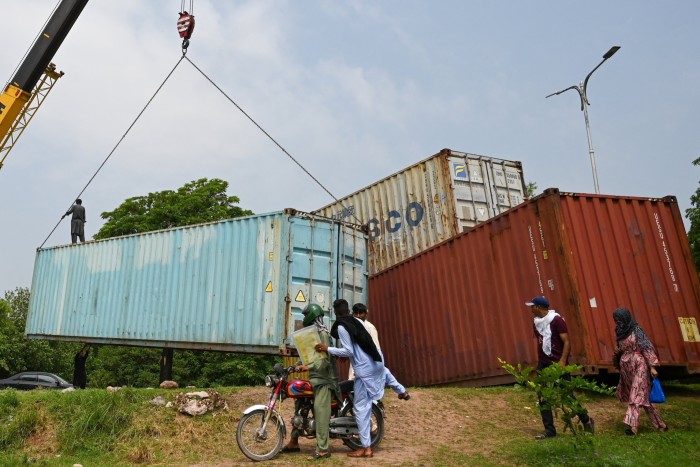Shipping containers are turning Islamabad into ‘Containeristan’

Unlock the Editor’s Digest for free
Roula Khalaf, Editor of the FT, selects her favourite stories in this weekly newsletter.
For months, vast shipping containers have been lining the roads into Pakistan’s capital city. The metal boxes, used as temporary blockades to stop protesters reaching state buildings, are turning Islamabad into a makeshift shipyard.
These containers are an eyesore in this otherwise verdant city. They are also a physical reminder of the crisis that is facing Pakistan’s government.
In February, a governing coalition came into power with the support of the country’s military. Candidates loyal to the opposition Pakistan Tehreek-e-Insaf party, led by jailed former cricketer and former prime minister Imran Khan, won more seats but were stopped from governing by the collection of traditional ruling parties.
This has resulted in fierce hostility from opposition supporters. Skyrocketing electricity bills and Pakistan’s cycle of religious culture wars have brought other frustrated demonstrators to the capital. In October, thousands of Khan’s supporters marched on the city. To block them, police rented hundreds of huge steel shipping containers and installed them on every major road. They also dug trenches into parts of the intercity motorway and cut off mobile connectivity and internet access.
Traffic in and out of the capital froze. Stranded commuters tried to call nearby friends in search of a couch to crash on. Tourists on their way to catch flights to Pakistan’s northern mountains waited in kilometre-long car queues and watched as angry truck drivers descended from their colourful lorries to berate traffic police. City life came to a halt.
Islamabad, a city of over 2mn that sits in the shadow of the Himalayan foothills, has long been regarded as a refuge from the loud chaos of the rest of the country. The biggest threats to peace are usually the wild boars and rhesus macaques that venture down the mountains in search of food.

The government’s use of container blockades is changing that. Locals say they are a manifestation of the country’s lengthy struggle to handle political disagreement. Pakistan inherited a powerful army and civil bureaucracy, plus a sweeping set of administrative laws designed to curb protest, from the former British Raj when it was founded in 1947.
“We never evolved to figure out how a government, or politicians, are supposed to engage with the population in a democratic way, so we rely on laws and methods designed to crush and control dissent,” said Arifa Noor, a local television anchor and political commentator.
The October blockade was an extreme case of what has become a go-to strategy for Pakistan’s coalition government. Shipping containers are not only used to close roads to prevent demonstrations but to halt traffic when the country is welcoming foreign dignitaries.
Days after the political rally in October, the government again shut down the city for three days, this time for a Shanghai Cooperation Organisation summit. It put up roadblocks that turned short journeys into four-hour, profanity-laden crawls. Restaurants and grocery stories closed. Those who failed to prepare went hungry.
FT Edit
This article was featured in FT Edit, a daily selection of eight stories to inform, inspire and delight, free to read for 30 days. Explore FT Edit here ➼
One commuter who lives on a farm on the outskirts of Islamabad and could not get into the city during the October blockade described it as “an attempt to turn Islamabad into something out of Stepford Wives”.
Pakistan’s government wants to present the country as a safe place to do business, despite an uptick in terrorist attacks. The goal of the container installations, according to a government spokesperson, is to show foreign dignitaries that Pakistan provides “foolproof security”.
The plan doesn’t convince many Islamabadis. Yet there is no end in sight to what locals are calling “Containeristan”.
“The containers aim to contain protests, but instead signal how weak the government is as it locks itself up and lays siege to its own citizens,” said Maleeha Lodhi, a former Pakistani ambassador to the UN and the US who lives in the capital.
“Ironically, if businesses are shut down so frequently then it doesn’t suggest that we are a country to do business in,” she adds. “We look unstable, insecure and unpredictable.”
#Shipping #containers #turning #Islamabad #Containeristan




